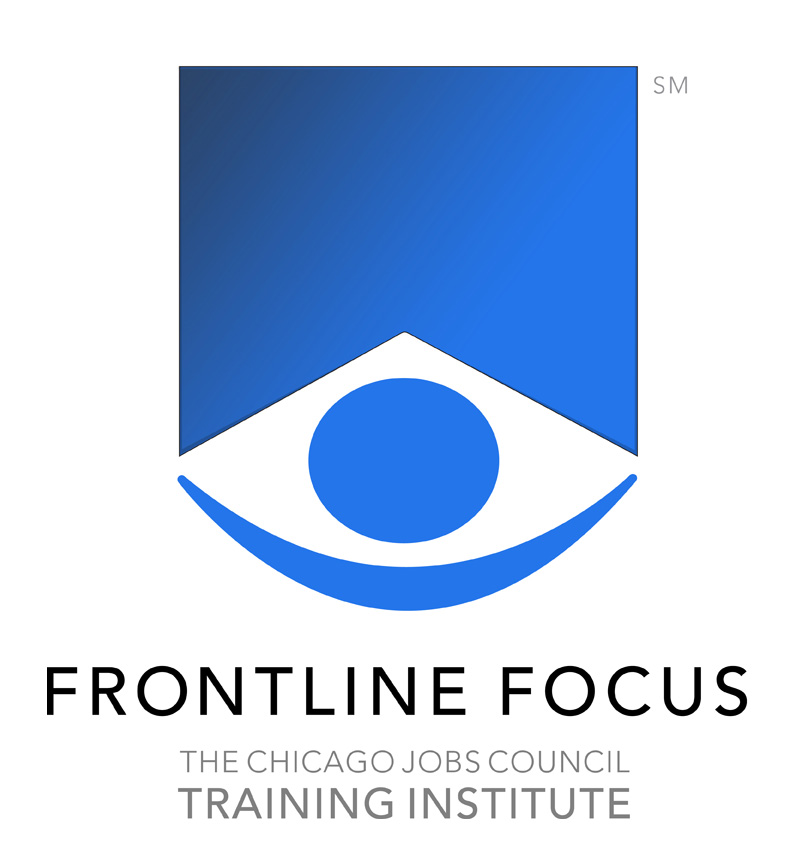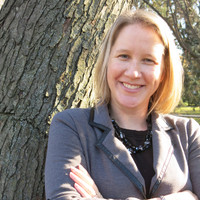
Summary
For individuals who are unemployed, workforce development programs serve as an important second-chance system, providing relevant career readiness training, connections to necessary social service supports, and access to employment opportunities. Often overlooked, however, are the staff -- case managers, job developers, trainers -- who serve as the first point of contact for these job seekers. Given the difficult nature of preparing job seekers for career path employment and catering to the hiring needs of businesses, frontline staff must possess a complete tool box of knowledge, skills, and strategies. This is where the Chicago Jobs Council’s Frontline Focus Training Institute (FFTI) serves as an essential resource, ensuring frontline workers have access to the tools, resources, and conditions necessary to succeed and thrive. Since its inception, FFTI has been informed by and responsive to the changing workforce development field, singularly focused on ensuring best practice research, curriculum, and resources get into the hands of frontline providers to both enhance and standardize the delivery of services across workforce development systems nationally.
Article
For individuals who are unemployed, workforce development programs serve as an important second-chance system, providing relevant career readiness training, connections to necessary social service supports, and access to employment opportunities. Often overlooked, however, are the staff -- case managers, job developers, trainers -- who serve as the first point of contact for job seekers. To be effective in their roles, frontline staff must possess a complete tool box of knowledge, skills, and strategies to assess, prepare, and connect job seekers to career-path employment while simultaneously meeting the hiring needs of their business clients. This is extremely challenging work; frontline staff are required to be teachers, mentors, salespeople, coaches, cheerleaders, counselors, and researchers. Now more than ever, with the lingering effects of the Illinois state budget crisis, frontline staff are contending with an increased caseload of job seekers facing ever-more severe challenges to achieving self-sufficiency. Coupled with the fact that frontline workers are often subject to poor working conditions themselves -- low pay, lack of training, emotional exhaustion, demanding and unrealistic performance measures, and routine overtime -- burnout and turnover are real challenges for the field. And, despite the importance of these positions, there is no clear educational or career path that leads individuals to the workforce development field. Often, transferable skills from a variety of other industries/occupations (i.e. social work, human resources, sales, retail) are what land individuals in these roles, but the learning curve of the workforce development field is great, and many flounder without appropriate supports. This is where the Chicago Jobs Council’s Frontline Focus Training Institute (FFTI) has become an essential resource, ensuring frontline workers have access to the tools, resources, and conditions necessary to succeed and thrive.
In 2003, the Chicago Jobs Council (CJC), a nonprofit organization serving as an intermediary within the workforce development field, conducted community research that revealed frontline staff didn’t have access to the training, tools, and networks they needed to adequately do their jobs. And, individual community based organizations were often too strapped to provide the professional development support their new hires required. To remedy this, the Jobs Council developed programming to fill in the gap. Launching with a brown bag lunch series, the program has grown exponentially, resulting in the creation of the Frontline Focus Training Institute. FFTI is celebrating its 15th anniversary this year (2018), and has established itself not only as a local go-to resource for professional development training and resources for Chicago’s workforce development field, but as a national model.
FFTI’s mission is to:
- Develop and enhance the skills, key competencies, and knowledge of workforce professionals in order to increase job effectiveness.
- Decrease burnout and stimulate career growth within the workforce development field.
- Create an environment that fosters collaboration and networking among workforce professionals.
- Establish the frontline role as an occupational destination.
Originally, the target population for FFTI trainings fell clearly into two roles: job developers, who focused more on employer relationships, and case managers, who focused more on job seekers. More recently, as the Illinois state budget crisis has forced layoffs and cutbacks across broad swaths of the social sector, frontline staff have been forced to do more with less. FFTI has seen increased participation from a wide variety of sectors (i.e. housing, mental health, education) and staff who now wear multiple hats in an attempt to be everything to their clients. As such, FFTI’s programming has grown and adapted to address this changing demographic, evidenced by the list of 25 half-day to two-day courses FFTI currently offers. Topics now cover everything from: how to prepare job seekers for employment (i.e. motivational interviewing, asset-based coaching, trauma-informed care); how to work with special populations of job seekers (i.e. individuals with criminal backgrounds, individuals experiencing homelessness, individuals with disabilities); and a variety of other professional skills (i.e. cultural competency, leadership, group facilitation techniques). On a yearly basis, FFTI trains 400-500 frontline staff.
Courses are capped at 25 individuals and are designed to be highly-experiential, giving participants an opportunity to practice skills and discuss relevant best-practices with their peers. Rather than lecturing, FFTI facilitators use role play, case studies, multimedia, and small and large group discussions to appeal to a variety of adult-learning styles and draw out the wisdom in the room. Facilitators themselves come from a variety of backgrounds and include social workers, therapists, current workforce development professionals, and leadership consultants. Courses are developed through an iterative process that involves talking to content experts in relevant fields, designing activities to best impart knowledge, and ensuring participants have an opportunity to network and share their real-world experience.
While FFTI’s a la carte model of training was developed to give frontline staff the ultimate flexibility in pursuing the targeted skills they need to be effective in their roles, we have also learned that cohorts can have an even greater impact on knowledge retention and behavior change. To address this, FFTI will launch a Workforce Development Credential training model this summer. This model will train a cohort of 20 workforce development professionals on a comprehensive list of key values, core competencies, and skills that are essential to being a quality workforce development professional, as codified through FFTI’s and others’ existing best-practice research. The competencies fall into five broad buckets, including: understanding the workforce development system; demonstrating a commitment to collaboration; knowing how to regularly use data to improve programming; effectively assessing, preparing, and connecting job seekers to employment; and having the ability to build strong, quality employer relationships. Participants will be accepted through a competitive application process and attend 10 trainings over the course of a year. The cohort will also complete a team capstone project and have access to mentoring via veteran professionals in the field. The comprehensive nature of this credential, in combination with the a la carte trainings that allow for targeted skill development, allow FFTI to truly elevate the quality of workforce services provided to those job seekers who need them the most.
FFTI is the only entity in the Midwest that provides this type of comprehensive professional development training specifically tailored to the workforce development field. While there are other organizations in Chicago offering general nonprofit training courses related to fundraising, board development, and leadership, FFTI fills a unique niche in the capacity building space. Nationally, a number of independent consultants tour the country, offering their expertise in one-off workshops, and several national organizations offer online training and webinars to the field. However, neither of these training frameworks can compete with the institutionalized knowledge, wrap-around programming, and platform FFTI has developed to deliver field-tested, best practice skills and strategies. Our belief in in-person, hands-on training has meant that FFTI doesn’t offer many web-based trainings. Rather, we focus on growing both the quality and quantity of our trainings by investing in our infrastructure -- ensuring we have easy-to-use registration processes, clear pricing, consistent branding, quality facilitators, transparent communication, and exceptional customer service.
FFTI runs on a lean staff of three full-time employees, and is supported by a cadre of external facilitators. Revenue to cover FFTI’s costs is pieced together from a variety of sources including: nominal direct funding from private foundations; general operating grants received by the Jobs Council; participant fees; and miscellaneous earned income from FFTI customized trainings and consulting projects. FFTI is not funded directly by any public workforce development dollars. Training fees are kept intentionally low for participants to encourage access, and a small number of scholarships are offered each year for workforce professionals who fit our priority inclusion criteria (e.g. women, people of color, staff working in under-resourced neighborhoods). Despite funders’ belief in the value of professional development and the role FFTI plays in the field, securing dedicated funding has been difficult as foundations often feel forced to choose between funding direct services and funding capacity building activities.
As FFTI has grown to be recognized as a national model in the workforce development training space, we have been invited to a number of cities across the country to train frontline staff eager for professional development opportunities. Given our limited staff capacity, the number of requests we can respond to in a given year is fairly small. To provide broader access to FFTI’s curricula and resources, our vision is to partner with organizations across the country that have the infrastructure in place to be affiliates and offer FFTI’s best practice curriculum to local practitioners. FFTI has the ability to license existing curriculum, provide trainer training for local facilitators, and offer start-up technical assistance, allowing for replication of the model across the country. As we think about scaling, there is also room for the public workforce development funding system to play a leading role by investing in FFTI as a resource for its staff nationwide. Particularly because we are focused on the same vision of elevating the quality of services provided to the nation’s most vulnerable job seekers. Since its inception FFTI has been informed by and responsive to the changing workforce development field. Now, building on our 15-year history, we want to ensure that our best practice research, curricula, and resources can both enhance and standardize the delivery of services across the national workforce development stage to improve outcomes for those job seekers who need it the most.
Author bio

Photo Credit: Allison Henry
Ellen Johnson, MSW, MPA has served as the Director of the Frontline Focus Training Institute at the Chicago Jobs Council since 2007, providing professional development training and capacity building resources to workforce development professionals. In practice, this includes developing training curriculum, facilitating customized workshops, researching best practices and cultivating strategic partnerships. Ellen’s belief in the power of responsive, innovative, well-run programming has been honed through her previous experience in fundraising, working with individuals with disabilities, and developing supportive services for mothers in prison.


